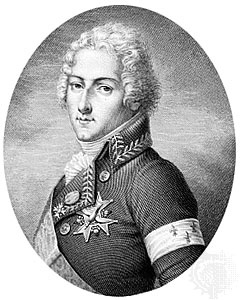Enghien, Louis-Antoine-Henri de Bourbon-Condé, Duke d'
French prince
born Aug. 2, 1772, Chantilly, Fr.
died March 21, 1804, Vincennes
 French prince whose execution, widely proclaimed as an atrocity, ended all hope of reconciliation between Napoleon and the royal house of Bourbon.
French prince whose execution, widely proclaimed as an atrocity, ended all hope of reconciliation between Napoleon and the royal house of Bourbon.The only son of Louis-Henri-Joseph, Duke de Bourbon, and Louise-Marie-Thérèse-Bathilde d'Orléans, he emigrated with his father at the outbreak of the French Revolution and served in his grandfather's émigré army from 1792 until its dissolution after the Treaty of Lunéville (1801). He secretly married Charlotte de Rohan-Rochefort and settled at Ettenheim, in Baden.
In 1804 Napoleon (Napoleon I), then first consul, received intelligence that connected the Duke d'Enghien with the conspiracy to overthrow him then being planned by Georges Cadoudal and Charles Pichegru. The report was false, but Napoleon ordered Enghien's arrest, and French gendarmes crossed the Rhine secretly and seized him. He was brought to the castle of Vincennes near Paris, where a court-martial was hurriedly gathered to try him, and he was shot about a week after his arrest. Though his father survived him, the Duke d'Enghien was genealogically the last prince of the house of Condé.
The indignation that the execution aroused throughout Europe provoked the often quoted and misquoted comment upon the execution, “C'est pire qu'un crime, c'est une faute” (“It's worse than a crime, it's a mistake”).
- lych-gate
- Lycia
- Lycian alphabet
- Lycian language
- Lycoming
- Lycoming College
- lycopene
- Lycoperdaceae
- Lycophron of Chalcis
- lycophyte
- Lycurgus
- lycée
- Lydd
- Lydgate, John
- Lydia
- Lydia Barrington Darragh
- Lydia Cabrera
- Lydia E. Pinkham
- Lydia Folger Fowler
- Lydia Maria Adams DeWitt
- Lydia Maria Child
- Lydia Moss Bradley
- Lydian language
- Lydian mode
- lye